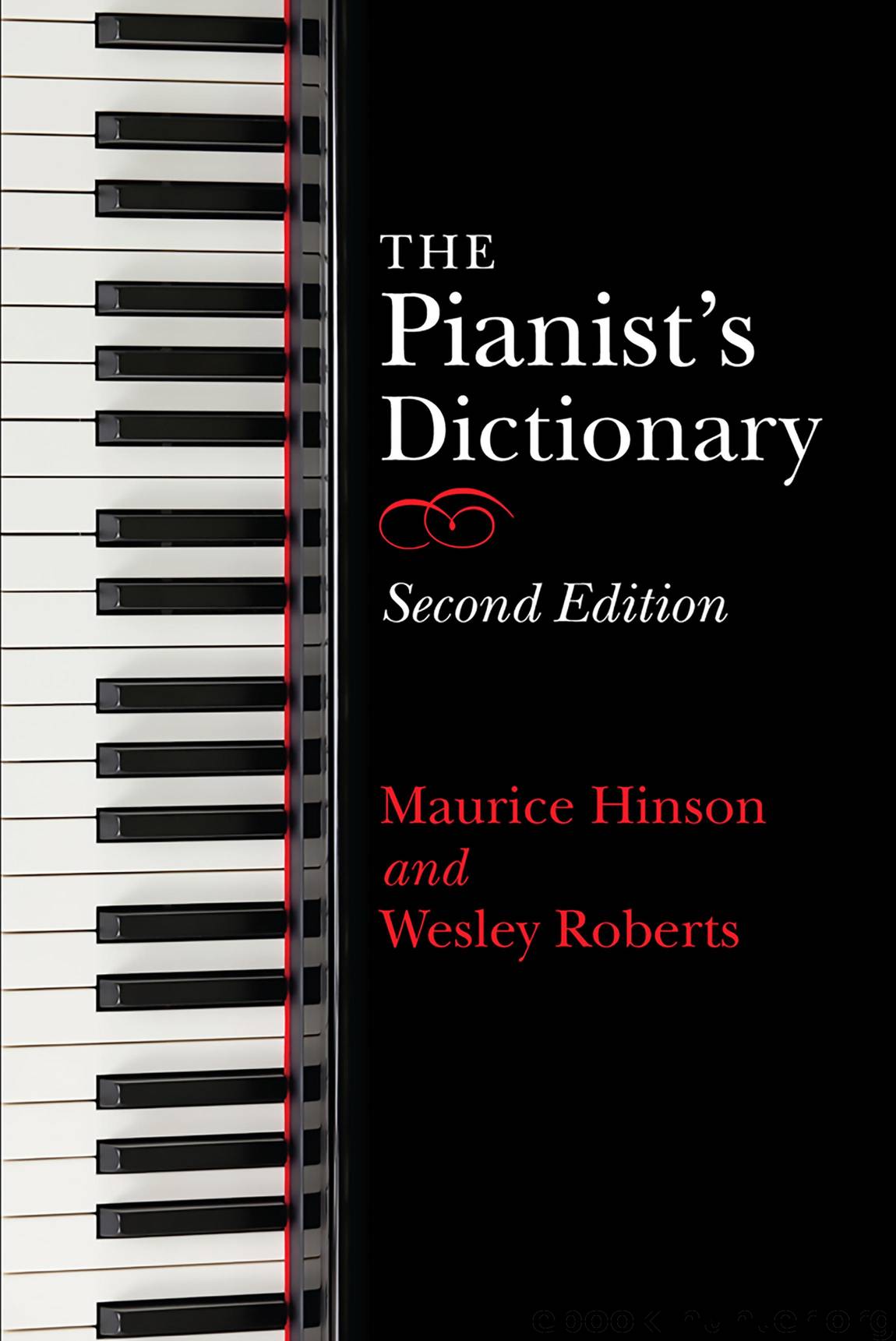The Pianist's Dictionary by Maurice Hinson

Author:Maurice Hinson
Language: eng
Format: azw3, epub
ISBN: 9780253047342
Publisher: Indiana University Press
Published: 2020-02-04T00:00:00+00:00
N
Nach (Ger.). After, to, according to.
Nach Belieben (Ger.). As desired, pleasure, ad libitum.
Nach jeden Stück ausgiebige Pause; die Stücke nicht ineinander übergehen! (Ger.). A substantial pause after each piece; the pieces must not connect without pause.
Nach und nach (Ger.). By degrees, little by little.
Nachdrücklich (Ger.). Emphatic, play with emphasis, forcibly.
Nachdrücksvoll (Ger.). Full of emphasis.
Nachgebend (Ger.). Becoming slower, slowing.
Nachlassend (Ger.). Retarding, relaxing, literally “leaving behind.” A direction to play slower and slower.
Nachtmusik (Ger.). Night music, generally of a serenade type. This term was used primarily in the late eighteenth century, especially by Mozart. Composers after 1800 tended to use the term Nachtstück in reference to night music or the nocturne.
Nachtstück (Ger.). Night music, nocturne. Robert Schumann composed four Nachtstücke, Op. 23.
Nagel, Louis (b. 1943). American pianist and teacher, Nagel studied with Dwight Anderson in Louisville and with Josef Raieff and Joseph Bloch at Juilliard. He won several awards and has concertized in Australia, Canada, Europe, and the United States. Nagel plays a broad range of repertoire from the Baroque to the twentieth century. His playing is noted for its freshness, superb technique, and infectious enthusiasm. He taught at the University of Michigan for forty-seven years (1969–2016) and is presently professor emeritus. Nagel gives two-piano recitals with his wife, Julie Jaffee Nagel, herself an accomplished pianist and psychologist, having authored the book Melodies of the Mind, which “explores how music touches our feelings and how music and psychological ideas are useful in everyday life.”1
Naïf, naïve (Fr.). Simple, natural, innocent.
Napoli. Francis Poulenc, 1922–25. Three movements: Barcarole, Nocturne, and Caprice Italien. This is one of Poulenc’s finest piano works.
Nat, Yves (1890–1956). French pianist, he studied at the Paris Conservatoire and taught there from 1934 to his death. He studied with Louis Diémer (1843–1919) and won first prize in piano. Some of his students include Yuri Boukoff, Theo Bruins, Jörg Demus, Geneviève Joy, Jacques Loussier, and Roy Hamlin Johnson.
Nationalism. Stylistic traits found in the music of one certain country, distinguishing it from that of other countries. The nationality of many composers can be identified by sounds in their music through the use of folk materials and picturesque stylistic traits.
Natural. The sign , which restores a note to its original position, canceling a sharp or flat.
Nazareth, Ernesto (1863–1934). Brazilian composer and pianist, he played with Heitor Villa-Lobos at the Odeon Cinema in Rio de Janeiro from 1920 to 1924. Nazareth composed around two hundred polkas, tangos, waltzes, and other dance compositions for piano. He was a pioneer in helping develop a national Brazilian style, writing pieces in European forms that featured Brazilian rhythms.
Ne garder la pédale que sur la 1re moitié de la mesure (Fr.). Hold the pedal only through the first half of the measure.
Ne . . . pas (Fr.). Not.
Ne pas presser (Fr.). With no accelerando.
Ne pas ralentir (Fr.). Do not slow down.
Neeley, Marilyn (1941–2007). American pianist, she studied with Ethel Leginska. A child prodigy, she gave her concert debut in New York’s Town Hall at the age of eight, performing works by Bach, Beethoven, Schubert, and Robert Schumann.
Download
This site does not store any files on its server. We only index and link to content provided by other sites. Please contact the content providers to delete copyright contents if any and email us, we'll remove relevant links or contents immediately.
The Goal (Off-Campus #4) by Elle Kennedy(12435)
Kathy Andrews Collection by Kathy Andrews(10521)
Diary of a Player by Brad Paisley(6866)
What Does This Button Do? by Bruce Dickinson(5527)
Assassin’s Fate by Robin Hobb(5238)
Big Little Lies by Liane Moriarty(4881)
Pale Blue Dot by Carl Sagan(4003)
Sticky Fingers by Joe Hagan(3454)
The Heroin Diaries by Nikki Sixx(2932)
The Death of the Heart by Elizabeth Bowen(2902)
Beneath These Shadows by Meghan March(2718)
The Help by Kathryn Stockett(2704)
Confessions of a Video Vixen by Karrine Steffans(2675)
How Music Works by David Byrne(2527)
Jam by Jam (epub)(2489)
Harry Potter 4 - Harry Potter and The Goblet of Fire by J.K.Rowling(2416)
Strange Fascination: David Bowie: The Definitive Story by David Buckley(2367)
Petty: The Biography by Warren Zanes(2238)
Darker Than the Deepest Sea by Trevor Dann(2208)
